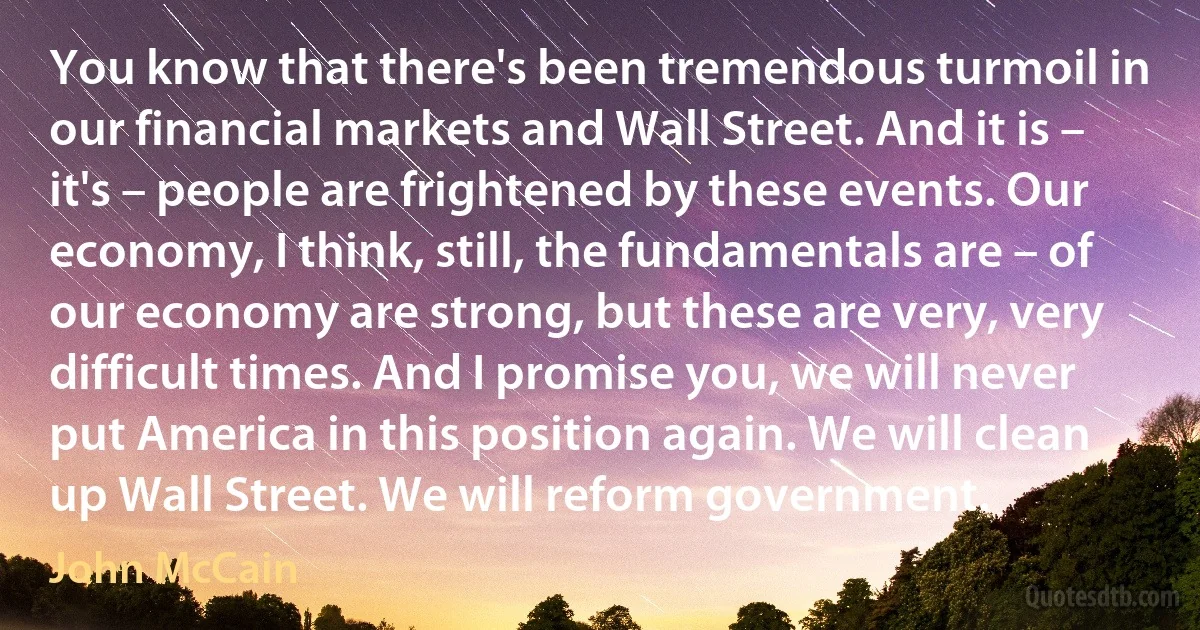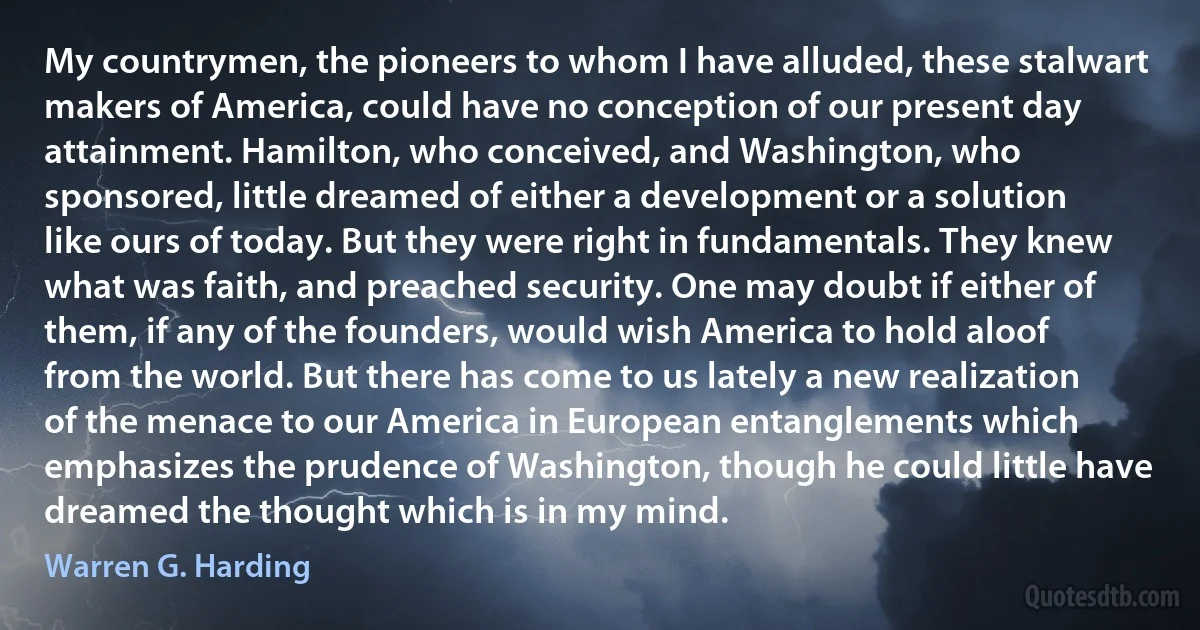Fundamentals Quotes - page 2
Thou hast asked concerning the fundamentals of religion and its ordinances: Know thou that first and foremost in religion is the knowledge of God. This attaineth its consummation in the recognition of His divine unity, which in turn reacheth its fulfilment in acclaiming that His hallowed and exalted Sanctuary, the Seat of His transcendent majesty, is sanctified from all attributes. And know thou that in this world of being the knowledge of God can never be attained save through the knowledge of Him Who is the Dayspring of divine Reality.

Báb
Leading a life like that got me thinking about some big questions. It is sometimes said that Americans and Europeans differ a lot and that they are growing further apart. I disagree-we share the same fundamentals, and that binds us together. Western societies guarantee their citizens something that no other civilizations grant them: privacy. It's one of those things you tend to take for granted unless you lose it. The importance of privacy is unique to Western society with its notion of the sovereign individual. In stark contrast to Western norms, Islam robs people of their privacy and dignity. Islamic societies-including Islamic enclaves in the West-exert tight social control that is indicative of the totalitarian character of Islam.

Geert Wilders
Let us get down to fundamentals. Is this an open, or is this a closed society? Is it a society where men can preach ideas - novel, unorthodox, heresies, to established churches and established governments - where there is a constant contest for men's hearts and minds on the basis of what is right, of what is just, of what is in the national interests, or is it a closed society where the mass media - the newspapers, the journals, publications, TV, radio - either bound by sound or by sight, or both sound and sight, men's minds are fed with a constant drone of sycophantic support for a particular orthodox political philosophy? I am talking of the principle of the open society, the open debate, ideas, not intimidation, persuasion not coercion...

Lee Kuan Yew
Revolted by the butchery of the 1914 World War, we in Zurich devoted ourselves to the arts. While guns rumbled in the distance, we sang, painted, made collages and wrote poems with all our might. We were seeking an art based on fundamentals, to cure the madness of the age, and find a new order of things that would restore the balance between heaven and hell. We had a dim premonition that power-mad gangsters would one day use art itself as a way of deadening men's minds.

Jean Arp
When the business man rebukes the idealism of his office-boy, it is commonly in some such speech as this: "Ah, yes, when one is young, one has these ideals in the abstract and these castles in the air; but in middle age they all break up like clouds, and one comes down to a belief in practical politics, to using the machinery one has and getting on with the world as it is.” Thus, at least, venerable and philanthropic old men now in their honoured graves used to talk to me when I was a boy. But since then I have grown up and have discovered that these philanthropic old men were telling lies. What has really happened is exactly the opposite of what they said would happen. They said that I should lose my ideals and begin to believe in the methods of practical politicians. Now, I have not lost my ideals in the least; my faith in fundamentals is exactly what it always was. What I have lost is my old childlike faith in practical politics.

G. K. Chesterton
Somehow, the practice of astronomy, physics, chemistry or biology normally fails to evoke the controversies over fundamentals that today seem endemic among, say, psychologists or sociologists. Attempting to discover the source of that difference led me to recognize the role in scientific research of what I have since called "paradigms.” These I take to be universally recognized scientific achievements that for a time provide model problems and solutions for a community of practitioners.

Thomas Samuel Kuhn
[H]ow much of the fundamentals of Astronomy may be obtained with the coarsest observation with the unaided eye. ...the science which is thus obtained by personal observations is vastly superior (as far as it goes) to that which is obtained by any other method. ...The knowledge ...inferred from actual personal observation carries with it a degree of reality and certainty, as the veritable science of external objects, which nothing else can give.

George Biddell Airy
With a note of music, one strikes the fundamental, and, in addition to the root note, other notes are generated: these are called the harmonic series...As one fundamental note contains within it other notes in the octave, two fundamentals produce a remarkable array of harmonics, and the number of possible combinations between all the notes increases phenomenally. With a triad, affairs stand a good chance of getting severely out of hand...

Robert Fripp
He was concerned only with the naked fundamentals of life. The warm intimacies of small, kindly things, the sentiments and delicious trivialities that make up so much of civilized men's lives were meaningless to him. A wolf was no less a wolf because a whim of chance caused him to run with the watch-dogs. Bloodshed and violence and savagery were the natural elements of the life Conan knew; he could not, and would never, understand the little things that are so dear to civilized men and women.

Robert E. Howard
Today I saw an exhibition of old Japanese paintings and sculpture [in Paris]. I was seized by the great strangeness of these things. It makes our own art seem all the more conventional to me. Our art is very meager in expressing the emotions we have inside. Old Japanese art seems to have a better solution for that... We must put more weight on the fundamentals!! When I took my eyes from these pictures and began looking at the people around me, I suddenly saw that human being are more remarkable, much more striking and surprising than they have been painted. A sudden realization like that comes only at moments.

Paula Modersohn-Becker
Spinoza, then, emerged as the supreme philosophical bogeyman of Early Enlightenment Europe. Admittedly, historians have rarely emphasized this. It has been much more common, and still is, to claim that Spinoza was rarely understood and had very little influence, a typical example of an abiding historiographical refrain which appears to be totally untrue but nevertheless, since the nineteenth century, has exerted an enduring appeal for all manner of scholars. In fact, no one else during the century 1650–1750 remotely rivalled Spinoza's notoriety as the chief challenger of the fundamentals of revealed religion, received ideas, tradition, morality, and what was everywhere regarded, in absolutist and non-absolutist states alike, as divinely constituted political authority.

Baruch Spinoza



